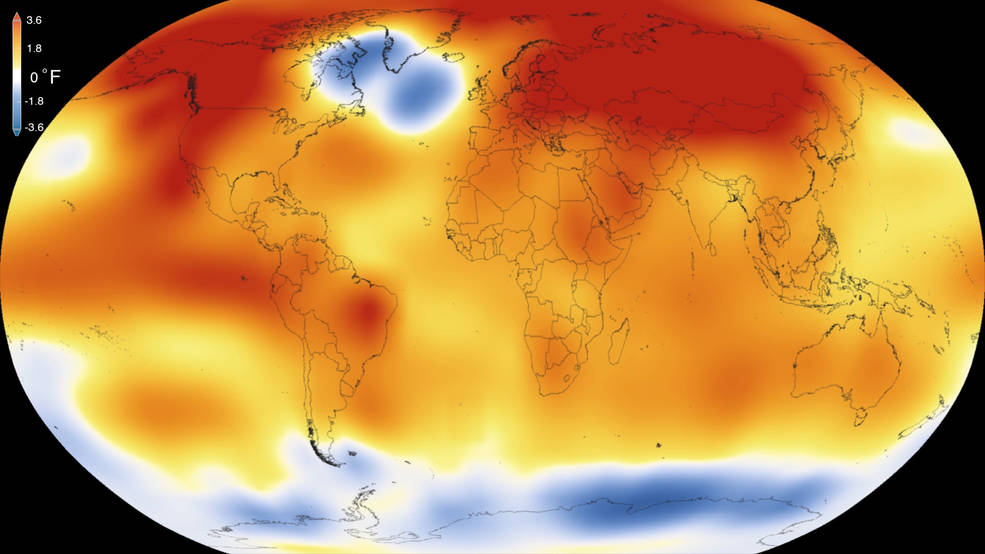30 May 2018
WASHINGTON — The wealthiest areas of the world will experience fewer changes in local climate compared to the poorest regions if global average surface temperatures reach the 1.5- or 2-degree Celsius (2.7- to 3.6-degree Fahrenheit) limit set by the Paris agreement, according to new research.
The new study, accepted for publication in Geophysical Research Letters, a journal of the American Geophysical Union, compares the difference between climate change impacts for wealthy and poor nations.
“The results are a stark example of the inequalities that come with global warming,” said Andrew King, a climate researcher at the ARC Centre of Excellence for Climate Extremes and the University of Melbourne in Australia, and lead author of the new study. “The richest countries that produced the most emissions are the least affected by heat when average temperatures climb to just 2 degrees Celsius [3.6 degrees Fahrenheit] while poorer nations bear the brunt of changing local climates and the consequences that come with them.”

This visualization illustrates Earth’s long-term warming trend, showing temperature changes from 1880 to 2015 as a rolling five-year average. Orange colors represent temperatures that are warmer than the 1951-80 baseline average, and blues represent temperatures cooler than the baseline.
Credits: Scientific Visualization Studio/Goddard Space Flight Center.
The least affected countries include most temperate nations, with the United Kingdom coming out ahead of all others. By contrast, the worst affected are in the Equatorial regions, including countries like the Democratic Republic of Congo.
This pattern holds true even if global average surface temperatures only reach 1.5 degrees Celsius (2.7 degrees Fahrenheit) above pre-industrial levels.
To get their results the researchers used a simple metric – the signal to noise ratio. The signal in this case is the local change in average temperatures caused by climate change. The noise is how variable the temperature is for that region.
In places outside the tropics, where there is greater year-to-year variability and those locations are more well adapted to a wide range of temperatures, the warming will be less noticeable.
But in Equatorial regions, where there is already a very high average temperature and less variation through the year, a small rise in temperatures due to climate change will be distinctly felt and have immediate impacts.
This difference in experienced temperature combined with the distribution of wealth across the world, with richer nations tending to be in temperate regions and the poorer nations in the tropics, adds to the future climate change burden of developing nations.
“Economically powerful nations, who are most responsible for the emissions that led to global warming, are going to have to pick up the slack if they want to maintain economic growth in developing countries,” said co-author Luke Harrington from the University of Oxford. “It’s why we need to invest in limiting the worst impacts of climate change for developing nations today. By assisting developing nations to meet these challenges we help maintain their economic stability and security into the future and by extension, our own as well.”
###
The American Geophysical Union is dedicated to advancing the Earth and space sciences for the benefit of humanity through its scholarly publications, conferences, and outreach programs. AGU is a not-for-profit, professional, scientific organization representing 60,000 members in 137 countries. Join the conversation on Facebook, Twitter, YouTube, and our other social media channels.
Notes for Journalists
This paper is freely available for 30 days. Journalists and public information officers (PIOs) can download a PDF copy of the article by clicking on this link: https://agupubs.onlinelibrary.wiley.com/doi/pdf/10.1002/2018GL078430
Journalists and PIOs may also order a copy of the final paper by emailing a request to Nanci Bompey at [email protected]. Please provide your name, the name of your publication, and your phone number.
Neither the paper nor this press release is under embargo.
The authors of this paper also wrote this story about their study published on The Conversation.
“The Inequality of Climate Change from 1.5°C to 2°C of Global Warming”
Authors:
Andrew D. King: ARC Centre of Excellence for Climate System Science, School of Earth Sciences, University of Melbourne, Melbourne, Australia;
Luke J. Harrington: Environmental Change Institute, University of Oxford, Oxford, United Kingdom.
Contact information for the authors:
Andrew D. King: +61 383 447 997 (office – GMT+10), +61 424 803 867 (mobile – GMT+10), [email protected]
Luke J. Harrington: +44 (0) 747 2048 779 (mobile – GMT+1), [email protected]
Nanci Bompey
+1 (202) 777-7524
[email protected]
ARC Centre of Excellence for Climate System Science Press Contact:
Alvin Stone
+61 418 617 366
[email protected]
University of Melbourne Press Contact:
Nerissa Hannink
+61 3 8344 8151
[email protected]
